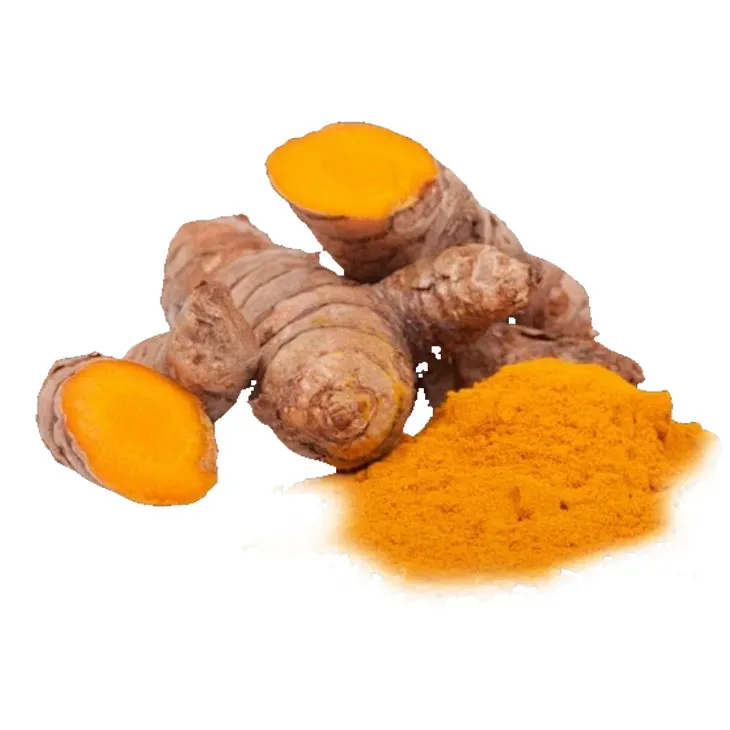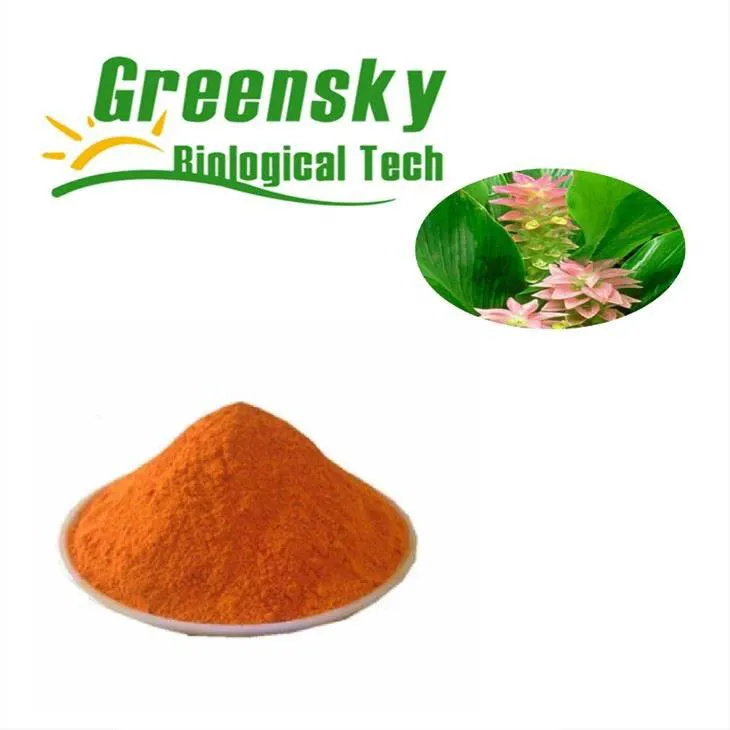- 0086-571-85302990
- sales@greenskybio.com
Understand the Benefits of Curcumin Supplements.
2024-11-13

Introduction to Curcumin
Curcumin is a natural compound that is derived from the rhizome of the turmeric plant (Curcuma longa). It has been used for centuries in traditional medicine, particularly in Ayurvedic and Chinese medicine. The bright yellow color of turmeric is due to Curcumin, which has a unique chemical structure that gives it a wide range of biological activities.

Anti - Inflammatory Properties
The Inflammation Problem
Chronic inflammation is at the root of many diseases, including arthritis, heart disease, diabetes, and certain cancers. Inflammation is the body's natural response to injury or infection, but when it becomes chronic, it can cause damage to tissues and organs over time. This is where curcumin's anti - inflammatory properties come into play.
How Curcumin Works Against Inflammation
Curcumin inhibits the activity of various inflammatory molecules in the body, such as cytokines and enzymes like cyclooxygenase - 2 (COX - 2). By doing so, it can reduce the production of inflammatory mediators and thereby decrease inflammation. For example, in arthritis patients, curcumin has been shown to reduce joint pain and swelling by suppressing the inflammatory pathways in the affected joints.

Antioxidant Activity
The Role of Antioxidants
Our bodies are constantly exposed to free radicals, which are unstable molecules that can cause oxidative stress. Oxidative stress is associated with aging, as well as a variety of diseases, including neurodegenerative disorders like Alzheimer's and Parkinson's diseases. Antioxidants are substances that can neutralize free radicals and protect cells from oxidative damage.
Curcumin as an Antioxidant
Curcumin is a powerful antioxidant. It can scavenge free radicals directly and also enhance the body's own antioxidant defense systems. For instance, it can increase the activity of antioxidant enzymes such as superoxide dismutase (SOD) and glutathione peroxidase. This antioxidant activity of curcumin helps to maintain the health of cells and tissues throughout the body.

Benefits for Cardiovascular Health
Cholesterol Regulation
High cholesterol levels, especially elevated levels of low - density lipoprotein (LDL) cholesterol, are a major risk factor for cardiovascular disease. Curcumin may help regulate cholesterol levels in several ways. It can inhibit the absorption of cholesterol in the intestine, and it also has the potential to increase the breakdown of cholesterol in the liver. Some studies have shown that curcumin supplementation can lead to a reduction in LDL cholesterol levels while maintaining or even increasing high - density lipoprotein (HDL) cholesterol levels, which is beneficial for heart health.
Improvement of Blood Vessel Function
Another important aspect of cardiovascular health is the proper function of blood vessels. Curcumin can improve blood vessel function by promoting the production of nitric oxide (NO). Nitric oxide is a gas molecule that helps to relax blood vessels, reducing blood pressure and improving blood flow. By enhancing nitric oxide production, curcumin can contribute to the overall health of the cardiovascular system.

Potential Role in Cancer Prevention
Interference with Cancer Cell Growth
Cancer is a complex disease characterized by uncontrolled cell growth and proliferation. Curcumin has been found to interfere with cancer cell growth in multiple ways. It can induce apoptosis (programmed cell death) in cancer cells, which is a natural mechanism for eliminating abnormal cells. Additionally, curcumin can inhibit the signaling pathways that are involved in cancer cell survival and proliferation, such as the PI3K/Akt and MAPK pathways.
Combination with Other Treatments
Curcumin may also have potential in combination with conventional cancer treatments. For example, it could enhance the effectiveness of chemotherapy or radiotherapy while reducing their side effects. However, more research is needed in this area to fully understand how curcumin can be integrated into cancer treatment regimens.

Other Health Benefits
Neuroprotective Effects
As mentioned earlier, curcumin's antioxidant properties make it potentially beneficial for neurodegenerative diseases. It may protect neurons from oxidative damage and reduce inflammation in the brain. Some studies have suggested that curcumin could play a role in preventing or delaying the onset of Alzheimer's disease by reducing the accumulation of amyloid - beta plaques, which are characteristic of the disease.
Benefits for Digestive Health
Curcumin can also have positive effects on the digestive system. It has been shown to have anti - ulcer properties, which may be due to its ability to reduce inflammation and protect the lining of the stomach and intestines. Additionally, curcumin may help in the management of inflammatory bowel diseases such as Crohn's disease and ulcerative colitis by modulating the immune response in the gut.
Considerations for Using Curcumin Supplements
Bioavailability
One of the challenges with curcumin is its relatively low bioavailability. This means that a large proportion of the curcumin consumed may not be absorbed and utilized by the body effectively. However, there are ways to improve its bioavailability. For example, combining curcumin with Black Pepper Extract (which contains piperine) can enhance its absorption. Additionally, some manufacturers use special formulations such as liposomal curcumin to increase bioavailability.
Dosage and Safety
When considering curcumin supplements, it is important to determine the appropriate dosage. While curcumin is generally considered safe, high doses may cause side effects such as gastrointestinal discomfort. The optimal dosage may vary depending on factors such as age, health status, and the specific purpose of supplementation. It is always advisable to consult a healthcare provider before starting any new supplement regimen.
Conclusion
Curcumin supplements offer a wide range of potential benefits, from anti - inflammatory and antioxidant effects to benefits for cardiovascular health, cancer prevention, and more. However, it is important to be aware of the considerations regarding bioavailability, dosage, and safety when using these supplements. With further research, curcumin may prove to be an even more valuable addition to promoting overall health and well - being.
FAQ:
What are the main benefits of curcumin supplements?
Curcumin supplements have multiple benefits. Their anti - inflammatory and antioxidant activities are beneficial for managing chronic diseases. For cardiovascular health, they can help regulate cholesterol levels and improve blood vessel function. They may also play a role in cancer prevention by interfering with cancer cell growth and proliferation.
How does curcumin in supplements help with cardiovascular health?
Curcumin in supplements may help with cardiovascular health by regulating cholesterol levels. It can also improve the function of blood vessels, which is important for maintaining a healthy cardiovascular system.
Can curcumin supplements really prevent cancer?
While curcumin supplements show promise in cancer prevention, more research is needed. They can interfere with cancer cell growth and proliferation, but currently, they cannot be considered a sole treatment or prevention method for cancer. However, as part of a healthy lifestyle, they may contribute to reducing the risk.
Are there any side effects of taking curcumin supplements?
When taken in normal doses, curcumin supplements are generally safe for most people. However, some people may experience mild side effects such as gastrointestinal discomfort, including nausea and diarrhea. High - dose curcumin supplements may also interact with certain medications, so it's important to consult a doctor before starting to take them.
How should curcumin supplements be taken?
The appropriate way to take curcumin supplements can vary depending on the product and individual needs. It is usually recommended to follow the instructions on the product label. In general, it can be taken with food to improve absorption. However, it's also advisable to consult a healthcare professional for personalized advice.
Related literature
- The Therapeutic Potential of Curcumin in Cardiovascular Diseases"
- "Curcumin and Cancer: From Molecular Mechanisms to Therapeutic Applications"
- "Beneficial Effects of Curcumin on Chronic Inflammatory Diseases"
- ▶ Hesperidin
- ▶ Citrus Bioflavonoids
- ▶ Plant Extract
- ▶ lycopene
- ▶ Diosmin
- ▶ Grape seed extract
- ▶ Sea buckthorn Juice Powder
- ▶ Fruit Juice Powder
- ▶ Hops Extract
- ▶ Artichoke Extract
- ▶ Mushroom extract
- ▶ Astaxanthin
- ▶ Green Tea Extract
- ▶ Curcumin
- ▶ Horse Chestnut Extract
- ▶ Other Product
- ▶ Boswellia Serrata Extract
- ▶ Resveratrol
- ▶ Marigold Extract
- ▶ Grape Leaf Extract
- ▶ New Product
- ▶ Aminolevulinic acid
- ▶ Cranberry Extract
- ▶ Red Yeast Rice
- ▶ Red Wine Extract
-
Berberis aristata Extract
2024-11-13
-
Mulberry leaf Extract
2024-11-13
-
Sophora Japonica Flower Extract
2024-11-13
-
Citrus bioflavonoids
2024-11-13
-
Bamboo Leaf extract
2024-11-13
-
Polygonum multiflorum extract
2024-11-13
-
Ginger Extract
2024-11-13
-
Stevia Extract
2024-11-13
-
Kidney Bean Extract
2024-11-13
-
Phellodendron Extract
2024-11-13





















